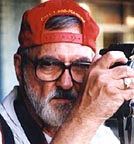|
|
|
|
Radio Corner SCANNING ON THE CAMPAIGN
|
 |
|
Many photojournalists and journalist possess a device which can both enhance their activities and provide entertainment while following candidates on the upcoming campaigns. It is a simple and inexpensive scanner radio also known as a police scanner. With such a device, the listener can monitor communications of the candidates they are following, the local police and security personnel and other journalists, motion picture crews and the like in a close range area. Although many local law enforcement agencies have instituted the use of "Trunking Radio Systems" which scramble police calls, most security organizations, media and miscellaneous radios have simple 2 way communication devices which can easily be monitored. The listener can follow what the candidate is doing, what the competition is up to and even listen to wireless microphones, cordless phones and find what the weather is going to be. In order to do this and be effective some additional equipment is needed and some knowledge and practice is necessary. Frequencies for weather are published but the other frequecies need to be searched out and found. In order to do this the field journalist will have to learn to use the search functions on the scanner radio. WHERE TO SEARCH No one is going to publish the frequencies of the candidate being followed or the frequencies of their security people, however for short range listening a device called a frequency scanner can be purchased inexpensively at most radio stores. With this device in hand along with the police scanner, most positions of interest can be found. In general the strongest signal in line of sight will be the first read on the frequency scanner, so the user will have to practice with the device until becoming proficient in its use. After a while it will be found that most of the listening is done in a few confined frequency ranges. A log of who was listened to and where should be kept. Small log books are also available at most radio shops. It is not going to make the journalist using the equipment popular so the equipment used should be kept small and after practicing the use of search features on the scanner radio the listener can use it while the radio is kept in a pocket or other out of site places. A simple ear plug speaker extension speaker should also be used. Some small inexpensive units, notably the Uniden Bearcat 80xlt and the 230xlt have automatic one button push for weather, but more important have a feature called band scan. The scanning radio has its frequency positions divided into bands and a one button push will place the radio into a limited frequency search range. Ranges are usually divided into areas of low vhf (30-50 mhz), high vhf (130-174 mhz), UHF (400-512 mhz) and shf (806-956 mhz). Almost every rental radio, and radios used by security people on the campaign trail can be found in these ranges. The scanners with the automatic search features will follow almost everything to be heard. The listener simply pushes the band set where he thinks what he wishes to monitor is and lets the scanner do the rest. When the desired party is found, the hold button is pushed and the scanner will stay where it was set and the transmitter to be monitored can be followed. Unfortunately, or fortunately, the media use the same types of equipment and can be simply monitored as well. In a more technical sense, if the frequency position of the radio to be monitored is not immediately apparant or if it is necessary to capture them swiftly, the frequency scanner can be used. This small hand-held device, when turned on, will show the frequency of the strongest nearby transmitter. This frequency can be entered rapidly into the scanning radio and monitoring begins. Opto Technology manufactures a number of small hand-held easy to use frequency scanners. An expenditure of less than $300 should place any journalist in the field in a position to listen to almost everyone in sight on the trail. Again, a frequency log of what has been listened to should be kept to save time. HOW TO SECURE YOUR OWN TRANSMISSION Now we have learned to be a "Sneaky Pete" and listen to the candidates security people and each other. AP can listen to AFP, Reuters can listen to Newsweek, we can all listen to each other. Now that's a scary thing to know. I can now chase after my favorite pro competitor on the campaign and listen to where he is going, what he is doing and what he thinks he is going to find, as well as what the campaign security people are doing, the weather, etc. Talk about an open convention. This should make the Republican and Democratic conventions a load more fun than ever before. We will spend so much time finding what the other guy is doing, we will forget to take photos. So we must follow some simple rules to negate what we just learned. 1. Assume some one is listening......big
brother is out there
BUT REMEMBER, RADIOMAN AND HIS FRIENDS ARE OUT THERE AND WE CAN FIND YOU SO WORK SMART. ----------------------------------- Comments are welcome. Radioman can be found at roger.w@ix.netcom.com that is if you can catch him. |
|